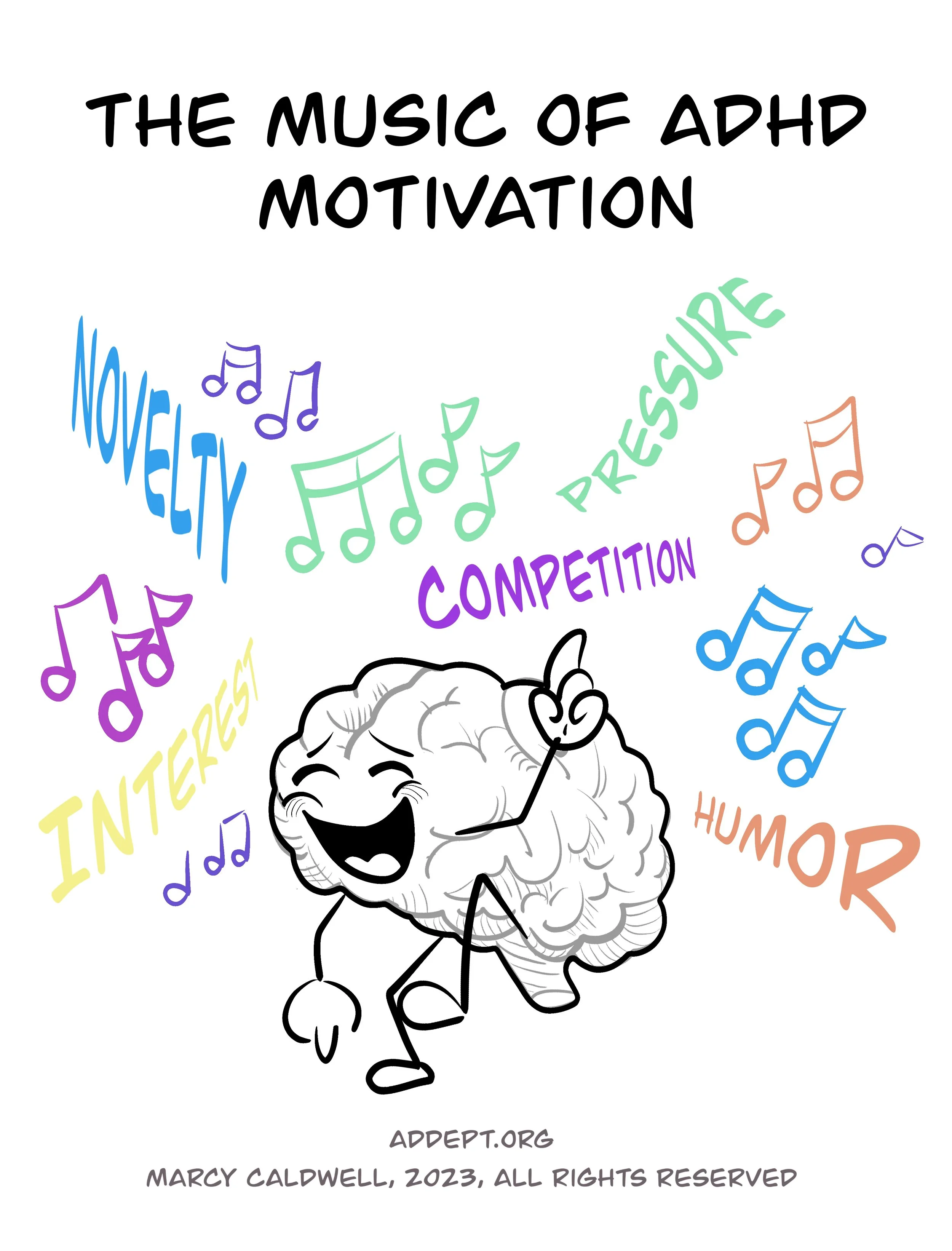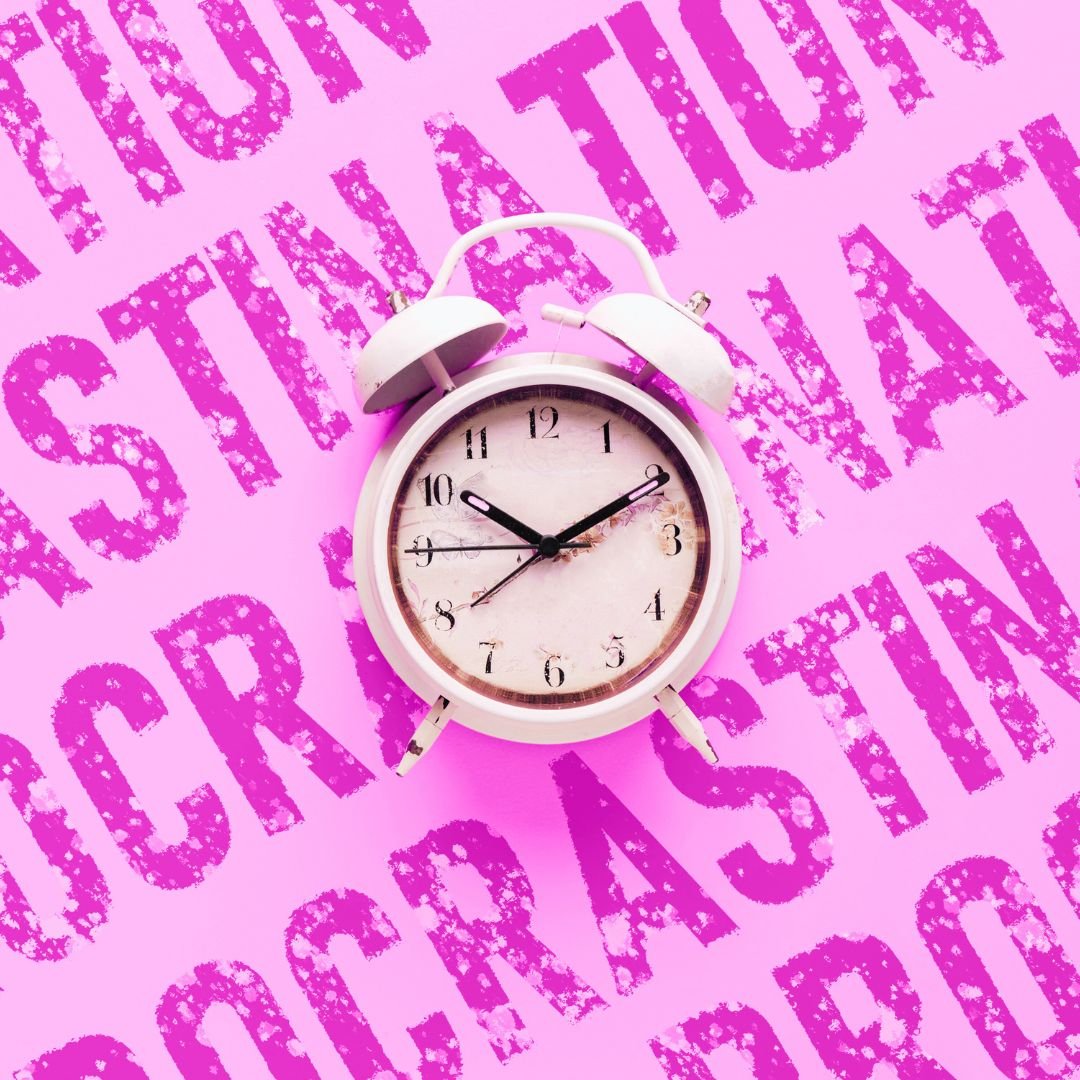Procrastination Unveiled:
Why just avoiding it won't cut it for ADHD Brains
Your to-do list is as long as a CVS receipt. You take one look, and a wave of dread and fear begins to crest, and QUICK! Your brain rushes to bury all those big, uncomfortable feelings under a comfy blanket of distractions.
You click through social media, lose yourself in Netflix marathons, and suddenly, hours have evaporated into thin air.
The weight of unfinished tasks starts to settle on your shoulders, causing a familiar shroud of guilt and shame to wrap around you. Thoughts of "I should have done this ages ago" and "Why am I such a procrastinator?" echo in your mind.
You’re trapped in the procrastination shame spiral, where every delay amplifies the anxiety and self-doubt. It feels terrible, and we want it to stop.
So, you take your brilliant brain on a quest for solutions:
Break tasks down
“Just do it”
Swallow the frog
Pomodoro
… the list of strategies you’ve tried starts to grow as long as that to-do list. And they’re OK. Maybe they work for a while, maybe they help get over a bit of the battle, but they never really cut it. And you find yourself right back in the spiral again.
Why? Why do these things that are touted by experts all around the world seem to work for everyone else?!?
Because they were made for everyone else.
They’re made for Neurotypical Brains that play by neurotypical rules of importance and rewards and punishment. Not for the unique and beautifully quirky stylings of an ADHD brain.
The ADHD Motivation Dance
ADHD brains are exactly that: beautiful, quirky, and unique. They’re not built like neurotypical brains, and they rarely play by the traditional (read: Neurotypical) rules. While many people thrive on discipline, routine, and the occasional pat on the back, ADHD motivation dances to a different beat.
ADHD brains are wired to be motivated by 5 things:
Novelty
Excitement,
Interest
Pressure
Competition
Humor
These are the tunes that get our ADHD brains moving and grooving.
When tasks don't tick any of these boxes– when we’re forced to dance amid crushing silence, big, hard, uncomfortable feelings rise up within, and we flee— resisting and avoiding those big feelings and uncompelling tasks like a dodgy potluck dish.
Manufacturing Music for Motivation
This all kind of stinks. Right? The music that works for neurotypical brains, that’s played all around the world- importance, reward, punishment– it doesn’t do it for ADHD brains, and it leaves us trying to move without anything to move to.
Yup. It stinks.
But all is not lost. I promise! Because we can make music for our brains to dance to. In fact, we do it all the time. You probably did it yesterday, the day before that, and almost every day before that as well. So did I.
You procrastinated!
You waited and waited and waited until a little bit of pressure built up and started singing a song that your brain could move to.
Think about it. Remember those last-minute homework assignments back in school? You'd drag your feet, feeling more like a sloth than a student, but as the deadline loomed closer, a burst of energy and focus would propel you forward. Suddenly, you could accomplish in an hour what took you days of dragging your feet.
Your 14-year-old self might not have realized you were doing it. But when you procrastinate, what you’re really doing is manufacturing motivation…. Real, true ADHD motivation.
Those other strategies? They might help manufacture neurotypical motivation- giving neurotypical brains the push and drive they need through importance or reward. But sparkly ADHD brains know they need something different, and so they go searching (or waiting) for the music that gets them moving.
The Dangers of Procrastination
But there’s a reason you went searching for ways to stop procrastinating. It’s painful. It causes shame, guilt, and stress and sometimes means you actually don’t have enough time to get it done.
ADHD brains are more likely to experience all of those negative consequences when they procrastinate (1).
And research shows that the negative effects of procrastination don’t end there. People who procrastinate more often are also more likely to struggle with both physical and mental health issues like:
Depression (2,3)
Stress (2,3)
Anxiety (2,3)
Sleep Problems (2,3)
Cardiovascular issues (4)
Obesity (5)
And so we’re back- right? Back to the idea this is a terrible thing that we do, we should feel horrible about it and make ourselves work differently. Well, hold on a second. Because there’s more…
There are actually 2 types of procrastination: Active and Passive. And only one of them does all that damage.
Detailing the Difference: Active and Passive Procrastination
In a landmark 2005 study, researchers first distinguished between two types of procrastination: passive procrastination and active procrastination.
Passive procrastination is what most of us do all the time. It’s the unintentional avoidance of tasks, the kind where you find yourself lost in a Netflix binge or scrolling aimlessly through social media.
It's almost always, a (conscious or unconscious) avoidance of uncomfortable emotions. But the real kicker is that while we might momentarily avoid that feeling for a while it ends up leaving us feeling frustrated, guilty, and stressed
Active procrastination, on the other hand, is when we intentionally wait until time pressure builds before taking action.
It’s the exact same behavior: you don’t do a big, bad, hard thing now, instead doing other things, and do the big, bad, hard thing later. But surprisingly, unlike its passive counterpart, active procrastination doesn't lead to those same negative effects on our health, well-being, and productivity.
How to Harness Procrastination for Good (according to the Research)
The Power of Active Procrastination
You might be wondering, "How can waiting until the last minute be a healthy approach?" Well, let me clarify. Active procrastination isn't about endlessly putting off tasks. It's a strategic approach where we harness the adrenaline rush of time pressure as a tool for motivation.
When we engage in active procrastination, we're consciously giving ourselves permission to delay action until the optimal moment. It's a way of aligning our ADHD brain's need for pressure and novelty with the demands of the task at hand.
And the cool thing is- that not only does it help us get over that overwhelmingly high initiation hurdle, but it doesn't come with the same seemingly never-ending list of negative consequences as passive procrastination.
Tips for Using Procrastination for Good (not shame spiraling evil)
It sounds all well and good to be intentional and use your procrastination to help, not hurt. But putting this into practice can be a bit tricky. Here are some tips to help:
Harness your ADHD motivation triggers:
Take note of the factors that motivate you—pressure, competition, novelty, interest, humor—and find ways to infuse them into your tasks. Get creative and make things exciting for yourself. Want some ideas? Check out 20 ways to hack your ADHD motivation.
Honor your brain’s unique relationship with time:
It’s really easy to judge ourselves when we don’t do things the way others do or the way we were taught we were “supposed to".” But those rules- they were made for different brains, and they don’t work for the way your brain was built. Time pressure is a powerful motivational strategy, and you have every right to use it without shame or guilt.
Embrace active procrastination and fill your other time:
Active procrastination has 2 inherent strengths: it allows you to build up pressure as fuel to propel you forward. But it also gives you other time. Time when you’re not just doing a thing to push away the thing you think you should be doing. This is real, true, unencumbered free time to do something else. So go forth! Do the other thing! Relax, pursue a hobby, be with family, do other work, whatever it is- relish it and enjoy it. Pressure is building, and it will be there for you when you need it.
Protect against the Vulnerability:
Every strategy has its own pros and cons, including Active Procrastination. The vulnerability inherent in time pressure is that sometimes the task is too big or the time too small to get it done the way we want. Finding a way to strike a balance between giving yourself enough time and leveraging the motivating power of deadlines can be tricky, but there are tools to help. Check out the ADDept ADHD More Joy, Less Effort Time Management Solution for a step-by-step guide on how to do exactly that.
Use Accountability and Real Deadlines:
Seek out the support of friends, family, or a coach who can help keep you on track. Set artificial but real deadlines with them a bit ahead of the natural deadline to give you the time to practice or perfect.
Procrastination doesn't have to be our downfall. Understanding how our brains can use it and letting go of this old, neurotypical belief that doing things early or ahead of time is the right way to do them gives us the power to get things done without shame.
So, go forth, my friend, and conquer those tasks with the energy and flair that only your ADHD brain can bring.
-
Halvorson, H. T., Halasz, V., Ratliff, K. R., Hewitt, J. K., & Barkley, R. A. (2019). Long-term outcomes of ADHD: A meta-analysis. Journal of the American Academy of Child & Adolescent Psychiatry, 58(6), 561-573.
Steel, P., Ferrari, J. R., & Procrastination Research Group. (2001). Procrastination and psychological distress: A review and theoretical integration. Psychological Bulletin, 127(6), 654-676.
Solomon, L. J., & Rothblum, E. D. (2003). Procrastination and depression: A meta-analytic review. Psychological Bulletin, 129(6), 959-982.
Choi, H., O'Brien, K. L., & Tice, D. M. (2011). Procrastination and cardiovascular disease risk factors: A systematic review and meta-analysis. Health Psychology, 30(2), 128-137.
Khosravi, A., Mohammadi, M. J., & Mohagheghi, M. (2017). The association between procrastination and obesity: A systematic review and meta-analysis. Journal of Obesity, 2017.
Ready to shift from
meltdown to mastery?
This online course has been designed specifically to help teach the strategies ADHD brains need to help them move from overwhelm and meltdowns to confident emotional mastery.
Want to know more about
thriving with ADHD?
Check out these other articles:















How to Beat the Winter Blues: Tips for ADHD and Seasonal Affective Disorder